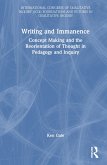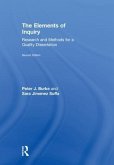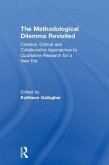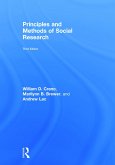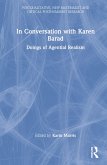This book puts into practice Karen Barad's agential realism, but also a range of postdevelopmental and posthumanist writings from diverse fields. It will be of particular interest to researchers looking for guidance to enact agential realist and posthumanist philosophies in research involving young children.
Hinweis: Dieser Artikel kann nur an eine deutsche Lieferadresse ausgeliefert werden.
Hinweis: Dieser Artikel kann nur an eine deutsche Lieferadresse ausgeliefert werden.
This book is a game changer for researchers drawing on postqualitative educational research in postdigital times. The authors have produced an exceptional storying of methodology and theory that opens thinking and practice. The same text also offers practical definitions and ways of working founded in the writings of known and new thinkers. Perhaps the book's greatest achievement is the decentering of western ways of knowing from the study of global children. A highlight is to read about children from the global south as children, not as deficit children or deficit Adults.
Professor Annette Woods, School of Early Childhood and Inclusive Education. Queensland University of Technology
Staying with the discomfort produced by having to conform to the requirements of a large-scale international research project, these researchers from the Global South re-turn to the data they collected. They show how data reveals itself differently in relation to posthuman, postdigital and decolonial theories. Concepts and methods relating to the Posts- are clearly explained and put to work, unsettling taken for granted assumptions about developmentalism, play and quantitative research methods. This opens the way for re-imaginings of research subjects, transcription, research sites and data analysis, in other words, for doing research differently. This accessible account is a must for scholars interested in undertaking postqualitative research.
Hilary Janks, Professor Emerita University of the Witwatersrand, South Africa
Professor Annette Woods, School of Early Childhood and Inclusive Education. Queensland University of Technology
Staying with the discomfort produced by having to conform to the requirements of a large-scale international research project, these researchers from the Global South re-turn to the data they collected. They show how data reveals itself differently in relation to posthuman, postdigital and decolonial theories. Concepts and methods relating to the Posts- are clearly explained and put to work, unsettling taken for granted assumptions about developmentalism, play and quantitative research methods. This opens the way for re-imaginings of research subjects, transcription, research sites and data analysis, in other words, for doing research differently. This accessible account is a must for scholars interested in undertaking postqualitative research.
Hilary Janks, Professor Emerita University of the Witwatersrand, South Africa




